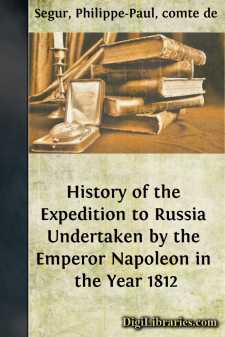Categories
- Antiques & Collectibles 13
- Architecture 36
- Art 48
- Bibles 22
- Biography & Autobiography 813
- Body, Mind & Spirit 142
- Business & Economics 28
- Children's Books 15
- Children's Fiction 12
- Computers 4
- Cooking 94
- Crafts & Hobbies 4
- Drama 346
- Education 46
- Family & Relationships 57
- Fiction 11828
- Games 19
- Gardening 17
- Health & Fitness 34
- History 1377
- House & Home 1
- Humor 147
- Juvenile Fiction 1873
- Juvenile Nonfiction 202
- Language Arts & Disciplines 88
- Law 16
- Literary Collections 686
- Literary Criticism 179
- Mathematics 13
- Medical 41
- Music 40
- Nature 179
- Non-Classifiable 1768
- Performing Arts 7
- Periodicals 1453
- Philosophy 64
- Photography 2
- Poetry 896
- Political Science 203
- Psychology 42
- Reference 154
- Religion 513
- Science 126
- Self-Help 84
- Social Science 81
- Sports & Recreation 34
- Study Aids 3
- Technology & Engineering 59
- Transportation 23
- Travel 463
- True Crime 29
History of the Expedition to Russia Undertaken by the Emperor Napoleon in the Year 1812
Categories:
Description:
Excerpt
Ever since 1807, when the space between the Rhine and the Niemen had been overrun, the two great empires of which these rivers were the boundaries had become rivals. By his concessions at Tilsit, at the expense of Prussia, Sweden, and Turkey, Napoleon had only satisfied Alexander. That treaty was the result of the defeat of Russia, and the date of her submission to the continental system. Among the Russians, it was regarded by some as attacking their honour; and by all it was felt to be ruinous to their interests.
By the continental system Napoleon had declared eternal war against the English; to that system he attached his honour, his political existence, and that of the nation under his sway. That system banished from the Continent all merchandise which was English, or had paid duty in any shape to England. He could not succeed in establishing it but by the unanimous consent of the continental nations, and that consent could not be hoped for but under a single and universal dominion.
France had besides alienated the nations of Europe from her by her conquests, and the monarchs by her revolution and her new dynasty. Henceforward she could no longer look forward to have either friends or rivals, but merely subjects; for the first would have been false, and the second implacable: it followed that all must be subject to her, or she to all.
With feelings of this kind, her leader, influenced by his position, and urged on by his enterprising character, filled his imagination with the vast project of becoming the sole master of Europe, by overwhelming Russia, and wresting Poland from her dominion. He had so much difficulty in concealing this project, that hints of it began to escape him in all directions. The immense preparations which so distant an enterprise required, the enormous quantities of provisions and ammunition collecting, the noise of arms, of carriages, and the march of such numbers of soldiers—the universal movement the majestic and terrible course of all the forces of the West against the East—every thing announced to Europe that her two colossuses were about to measure their strength with each other.
But, to get within reach of Russia, it was necessary to go beyond Austria, to cross Prussia, and to march between Sweden and Turkey; an offensive alliance with these four powers was therefore indispensable. Austria was as much subject to the influence of Napoleon as Prussia was to his arms: to them he had only to declare his intentions; Austria voluntarily and eagerly entered into his plans, and Prussia he easily prevailed on to join him.
Austria, however, did not act blindly. Situated between the two great colossuses of the North and the West, she was not displeased to see them at war: she looked to their mutually weakening each other, and to the increase of her own strength by their exhaustion. On the 14th of March, 1812, she promised France 30,000 men; but she prepared prudent secret instructions for them. She obtained a vague promise of an increase of territory, as an indemnity for her share of the expenses of the war, and the possession of Gallicia was guaranteed to her. She admitted, however, the future possibility of a cession of part of that province to the kingdom of Poland; but in exchange for that she would have received the Illyrian provinces. The sixth article of the secret treaty establishes that fact.
The success of the war, therefore, in no degree depended on the cession of Gallicia, or the difficulties arising from the Austrian jealousy of that possession....


